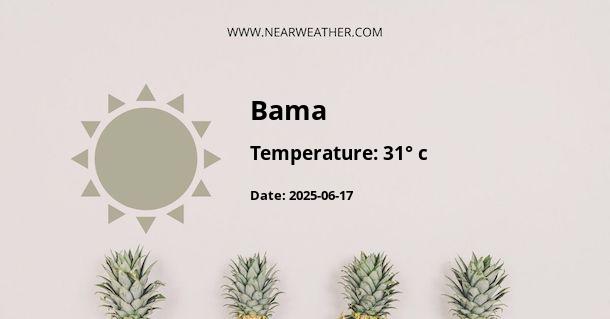Climate and Weather in Bama, Nigeria
Bama is a town located in the northeastern part of Nigeria, specifically in the Borno State. It lies within the Sahel region, which is known for its semi-arid climate and distinct weather patterns. Understanding the climate and weather in Bama is crucial for residents, tourists, and researchers alike. In this article, we will explore the year-round climate, average temperatures, rainfall patterns, and other weather-related aspects of Bama.
Geographical Location
Bama is situated at approximately 11.522°N latitude and 13.686°E longitude. It is located in the northeastern part of Nigeria, close to the border with Cameroon. The town sits at an elevation of approximately 387 meters (1,270 feet) above sea level.
Climate Classification
Bama falls under the Köppen climate classification BSh, which stands for a semi-arid climate with a hot steppe climate subtype. This means that the town experiences hot and dry conditions for most of the year, with a short rainy season.
Temperature
The temperatures in Bama are generally high throughout the year, with significant variations between day and night. The hottest months are typically March, April, and May, with average daytime temperatures ranging from 35°C to 40°C (95°F to 104°F). During the night, temperatures drop to around 20°C to 25°C (68°F to 77°F).
During the cooler months, from November to February, the average daytime temperatures range between 27°C and 30°C (81°F to 86°F). Nighttime temperatures during this period can drop to around 10°C to 15°C (50°F to 59°F).
The extreme heat during the summer months can be challenging for outdoor activities, and it is essential to take precautions such as staying hydrated and avoiding direct exposure to the sun for extended periods.
Rainfall
Bama experiences a short rainy season that typically occurs between June and September. The town receives an average annual rainfall of approximately 500 to 600 millimeters (20 to 24 inches). Most of the precipitation falls during these months, with July and August being the wettest.
During the rainy season, Bama experiences occasional thunderstorms and heavy downpours. These rains provide much-needed relief from the prolonged dry period but can also result in flash floods in low-lying areas.
Wind Patterns
Bama is influenced by the Harmattan wind, which blows from the northeast between November and February. The Harmattan wind brings dry and dusty conditions to the region, often reducing visibility and causing discomfort. It is advisable to take precautions such as wearing protective clothing and staying indoors during this period.
Weather Hazards
In addition to the extreme heat and occasional flash floods, Bama, like other areas in the Sahel region, is prone to dust storms and sandstorms. These weather phenomena can significantly reduce visibility and may cause respiratory problems for vulnerable individuals. It is important to monitor weather forecasts and take necessary precautions during such events.
Conclusion
Bama, Nigeria, experiences a semi-arid climate with hot and dry conditions for most of the year. The town has high daytime temperatures, particularly during the summer months, with a short rainy season between June and September. Understanding the climate and weather patterns in Bama is crucial for residents, tourists, and researchers to plan activities and take necessary precautions to ensure their safety and well-being.
A - Bama's Latitude is 11.522100 & Longitude is 13.685580.
A - Weather in Bama is 21° today.
A - Climate Conditions in Bama shows broken clouds today.
A - Humidity in Bama is 47% today.
A - Wind speed in Bama is 10.19 km/h, flowing at 39° wind direction. today.
